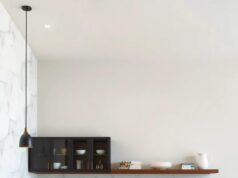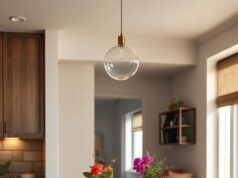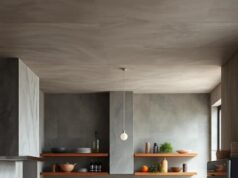In today’s fast-paced world, where urban living ofen comes with the challenge of limited space, the marriage of style and function has never been more vital. The modern small kitchen and living room combo is not just a necessity but a canvas for creativity—a unique chance to harmonize aesthetics with practicality. This article delves into innovative design solutions that transform these compact spaces into multifunctional havens,where every inch is optimized,and every detail speaks of personal taste. Whether you’re navigating the constraints of apartment living or simply seeking inspiration to revamp your home, explore how strategic layouts, smart storage, and thoughtful decor can redefine the very essence of small space living, marrying elegance with efficiency in ways that are both inspiring and attainable.
exploring Space-Saving Furniture Solutions for the Ultimate Small kitchen and Living Room Combo
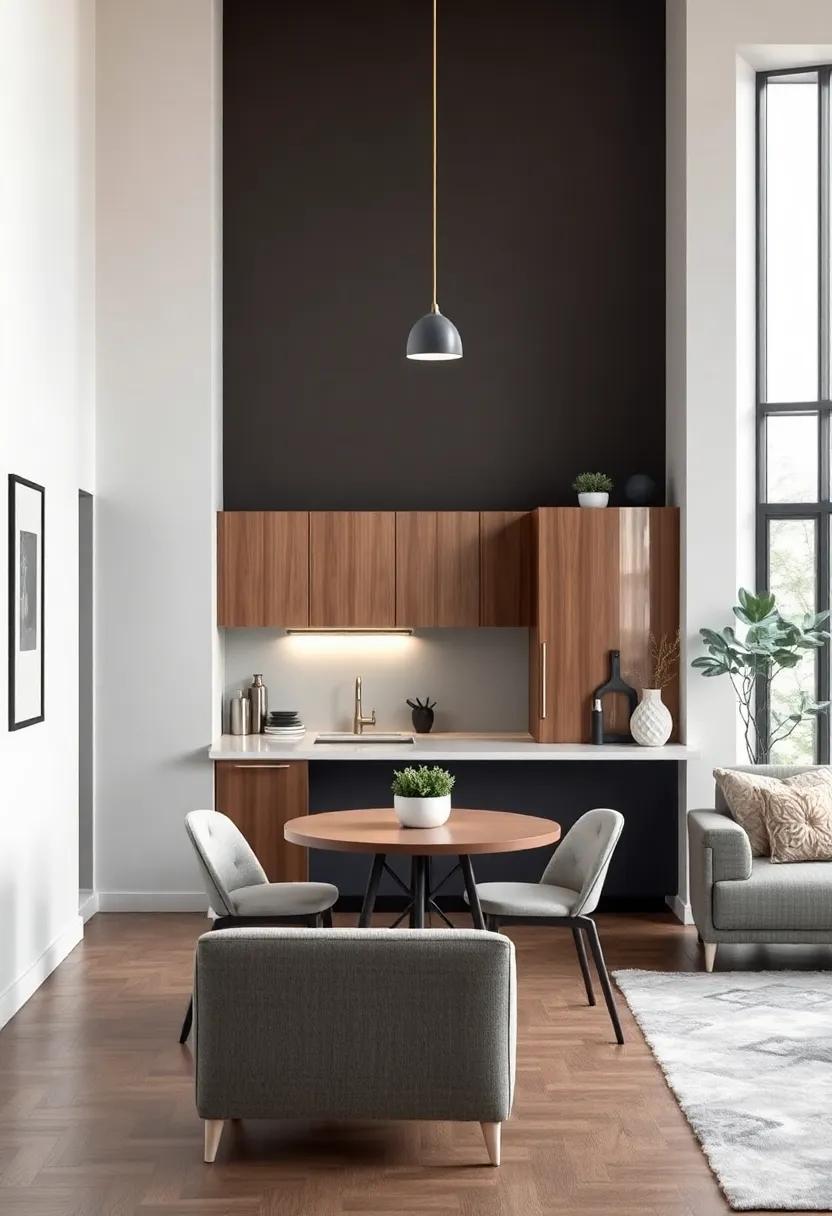
In a world where space is at a premium, space-saving furniture offers innovative solutions for integrating style and functionality into your small kitchen and living room combo. Consider multipurpose pieces that can elegantly transition between tasks. For instance, a compact dining table that folds down can accommodate meals for two or expand for gatherings. Additionally, a bench with hidden storage serves as both seating and a neat place to stow away kitchen essentials. By selecting furniture with dual functions, you maximize your available space while keeping the area feeling open and inviting.
Another clever approach is utilizing vertical space with wall-mounted shelving and cabinets.These can hold everything from cookbooks to decorative items, elevating your decor without encroaching on your floor area. Incorporating lightweight and movable furniture, such as a bar cart or a nesting table, allows you to adapt the layout of your small living space as needed. Explore these inventive options to ensure your kitchen and living room not only meet your practical needs but also reflect your personal style in an efficient manner.
Integrating Color Schemes to Enhance the Aesthetic Appeal of Compact Living Areas
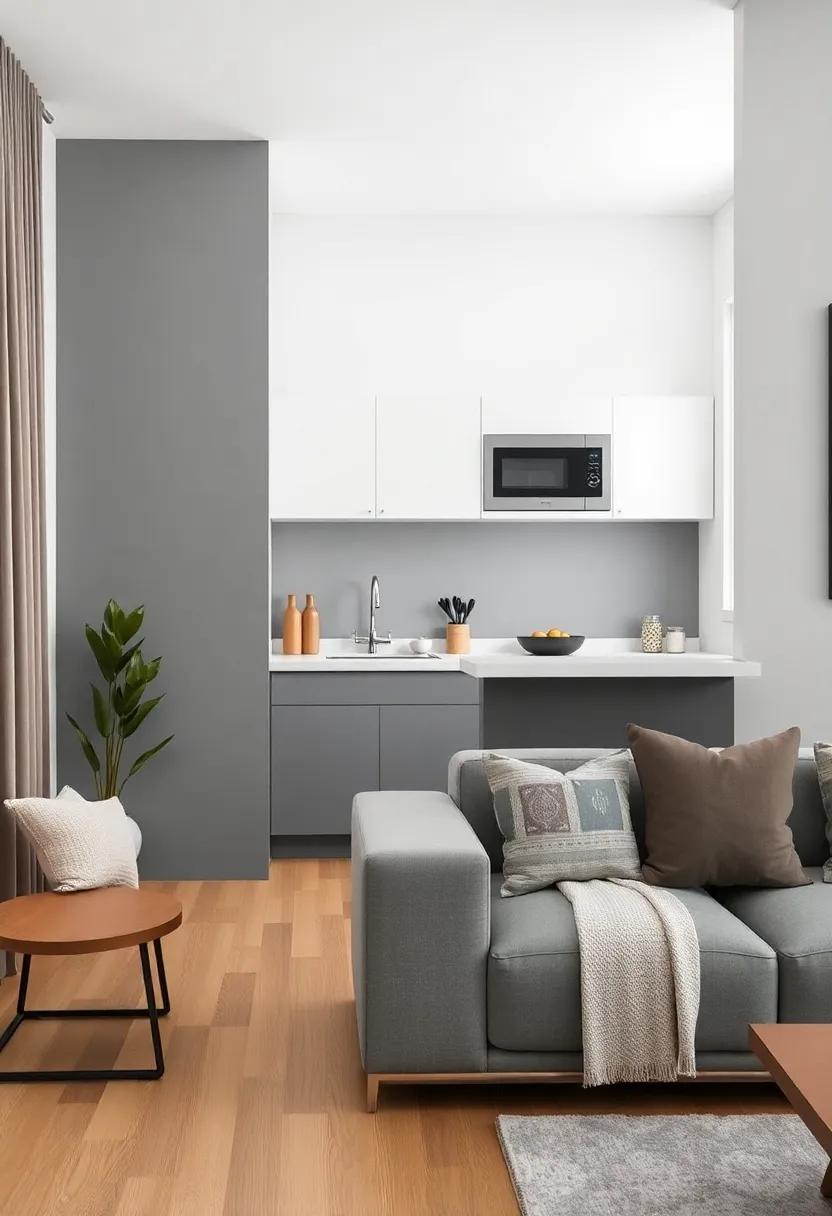
Color schemes play a pivotal role in defining the character of compact living areas, transforming them from mere spaces into inviting havens. By carefully selecting a palette that reflects your personal style while optimizing light and space, you can effectively enhance both the visual and emotional appeal of your kitchen and living room combination. Consider incorporating shades that create an illusion of spaciousness, such as soft pastels or light neutrals, balanced by vibrant accents to inject personality and warmth. To achieve cohesion,think about the following elements:
- Harmonizing Colors: Use complementary colors in furnishings and accessories.
- Accent Walls: Introduce a bold color on a feature wall to create a focal point.
- Textured Fabrics: Layer textures through textiles in various shades of your primary color scheme.
Another effective approach is to utilize color gradients and tonal variations to maintain a sense of flow throughout your space. This method not only links different functional areas but also prevents the feeling of disconnection that can arise in compact designs. For instance, if your kitchen features a deep navy cabinetry, consider incorporating lighter shades of blue in the living room through cushions or wall art. Use the table below to visualize how to coordinate these color choices:
| Color Zone | Recommended Shades | Accent Options |
|---|---|---|
| Kitchen | Light Gray, Soft White | Radiant red Utensils, Metallic Accents |
| living Room | Cool Blue, Warm Beige | Pops of Coral, Earthy Textiles |
Innovative Storage Ideas to Maximize Functionality in Small Kitchen and Living Room Spaces
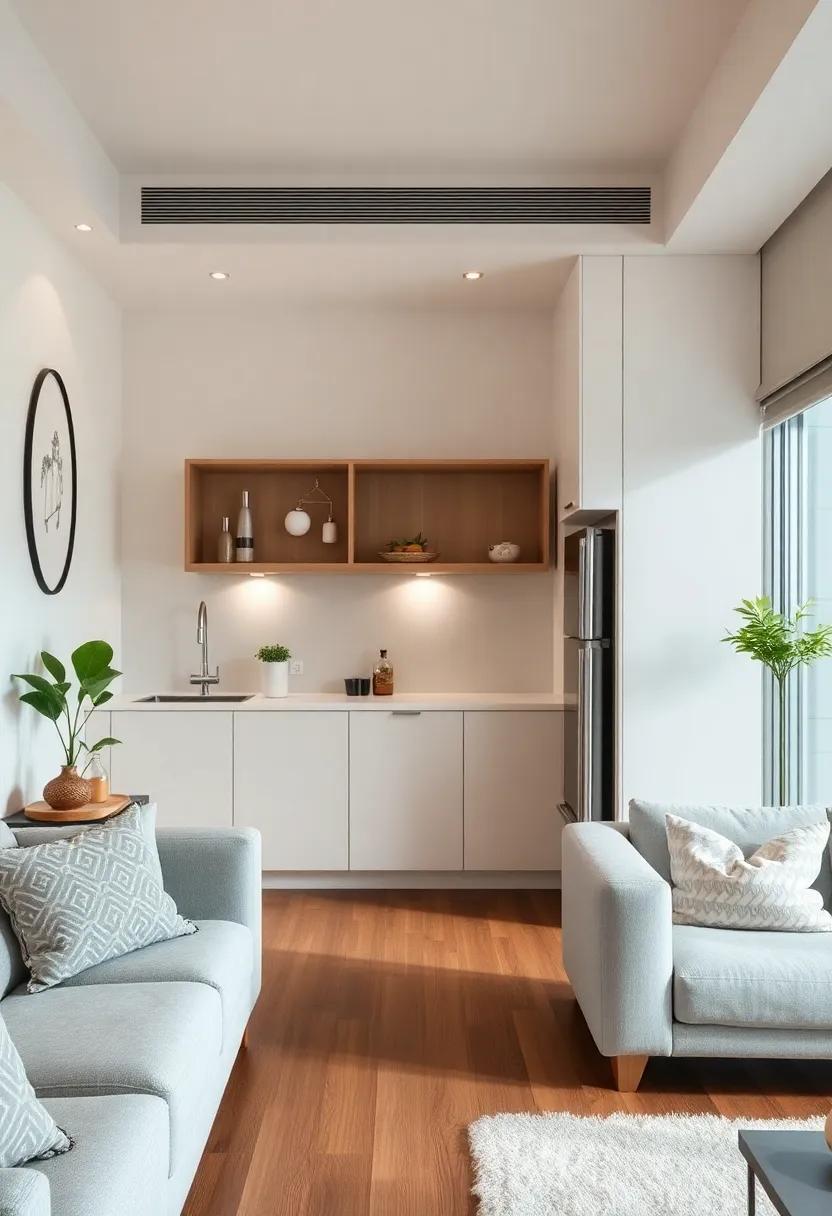
In small kitchen and living room combos, creativity is key to maximizing both space and style. Multi-functional furniture can transform a cramped area into a stylish and practical haven. Consider a storage ottoman that not only serves as a footrest but also provides hidden compartments for blankets or magazines. Additionally, wall-mounted shelves can free up valuable floor space while displaying decorative items or keeping essentials within reach.Use magnetic strips to keep knives and tools off the counters, while under-cabinet lighting can add ambiance without sacrificing square footage.
Another innovative idea is to employ hanging storage solutions for items that woudl or else clutter surfaces. Pegboards can organize pots, pans, and utensils, turning them into artful displays. Meanwhile, vertical space is often underutilized; investing in tall bookcases that reach the ceiling can create a striking focal point while effectively managing clutter. A small dining table with built-in storage compartments allows for fast cleanup and doubles as a workspace. These clever ideas not only enhance functionality but also elevate the aesthetic appeal of small living environments.
Creating Versatile Zones: How to Define Areas for Cooking and Relaxation
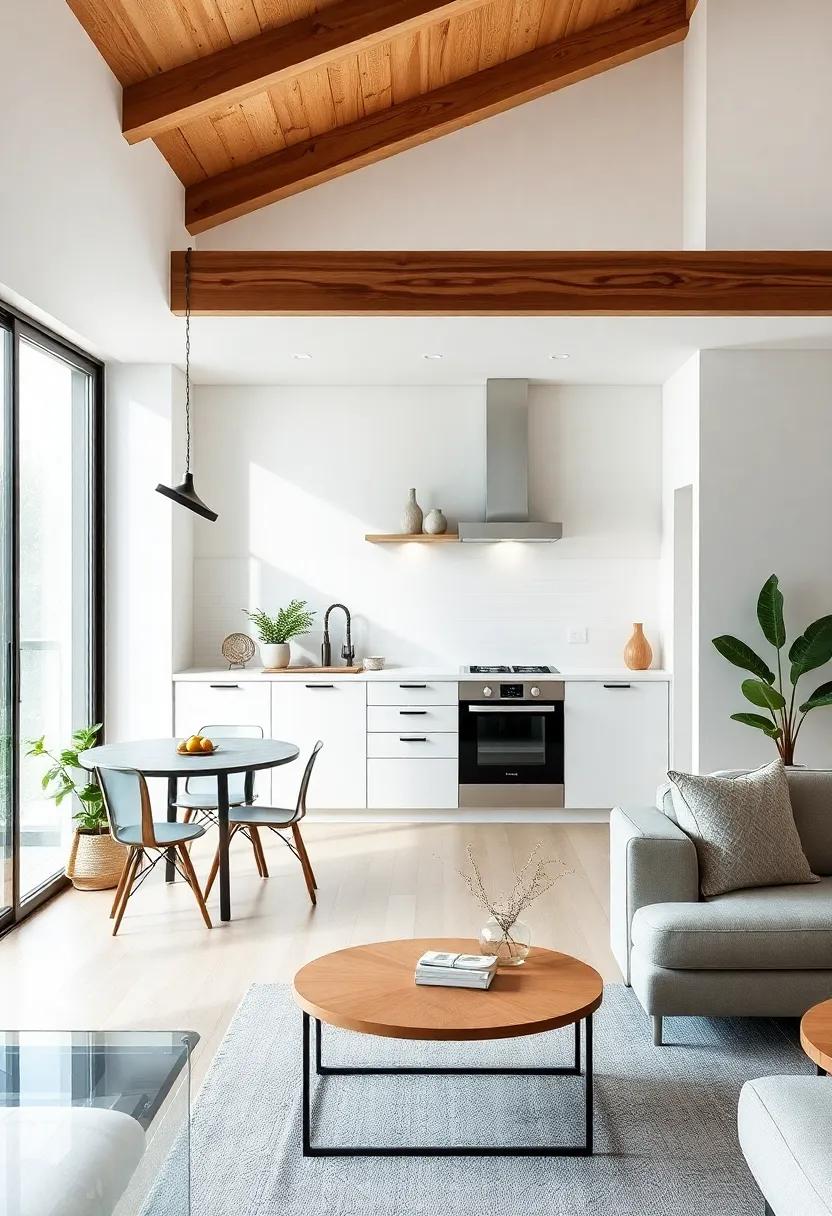
in a small kitchen and living room combo, the key to creating versatile zones lies in the delicate balance between functionality and aesthetics. Start by utilizing furniture arrangements that clearly define cooking and relaxation areas. For example, a kitchen island can serve as a cooking station while simultaneously doubling as a breakfast bar or additional seating. Use dividers, such as a stylish bookshelf or a decorative screen, to delineate spaces without sacrificing openness. Additionally,consider the use of color and texture to differentiate zones; warm colors can invite relaxation,while brighter hues may invigorate the cooking area.
Incorporating smart storage solutions enhances the usability of both zones. Utilize vertical space with open shelving in the kitchen to keep frequently used items at hand, and adapt that same shelving to include decorative elements in the living room.choose multi-functional furniture, such as an ottoman that doubles as a coffee table, to maintain a seamless flow between relaxation and culinary activities. To visually enhance the experiance, a well-placed area rug can anchor the living space, creating a cozy atmosphere while subtly signaling the transition from cooking to unwinding.
Lighting Design Strategies for Elevating Ambiance in Combined Living Spaces
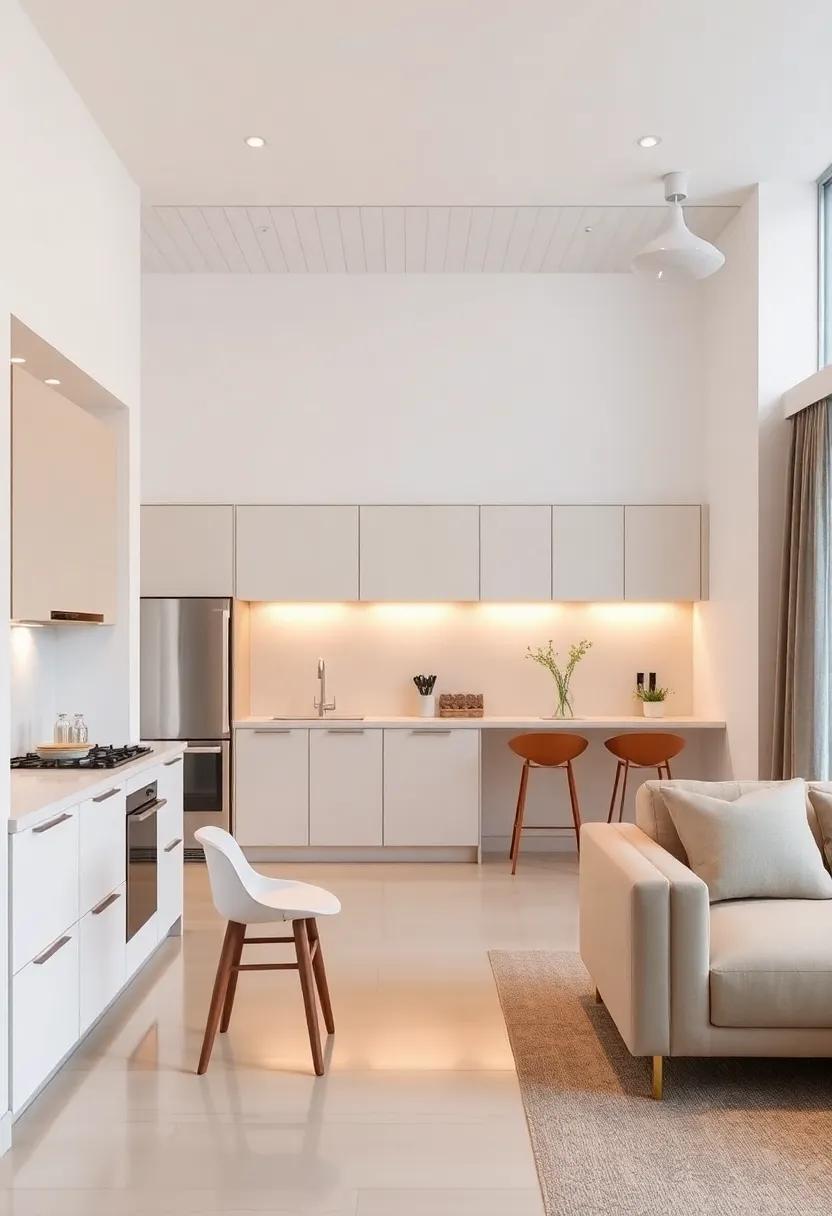
Creating the right atmosphere in a combined living space requires a thoughtful approach to lighting design that balances function and style. Begin by layering your lighting to achieve a multi-dimensional feel. Consider using ambient lighting to provide general illumination, task lighting for specific work areas, and accent lighting to highlight architectural features or artwork. Use various sources such as ceiling fixtures, floor lamps, and under-cabinet lighting to draw the eye and create depth. Additionally, consider placing dimmer switches to adjust the light intensity according to the mood or time of day, allowing for flexibility in how the space feels throughout daily activities.
incorporating smart lighting technology can also enhance the ambiance while adding a modern touch. Use smart bulbs that change color and can be controlled via smartphones or voice commands, adapting to different occasions—from energetic family gatherings to cozy evenings. Moreover, selecting fixtures with open or semi-transparent designs allows light to weave through the space seamlessly, giving it an airy, expansive feel. Don’t overlook the color temperature of your bulbs; warm whites too create a welcoming surroundings while cooler tones can invigorate and energize. By thoughtfully curating your lighting strategies, you can transform your small kitchen and living room combo into an inviting and stylish retreat.
Incorporating Multi-Functional Appliances for Efficient Small Kitchen Designs
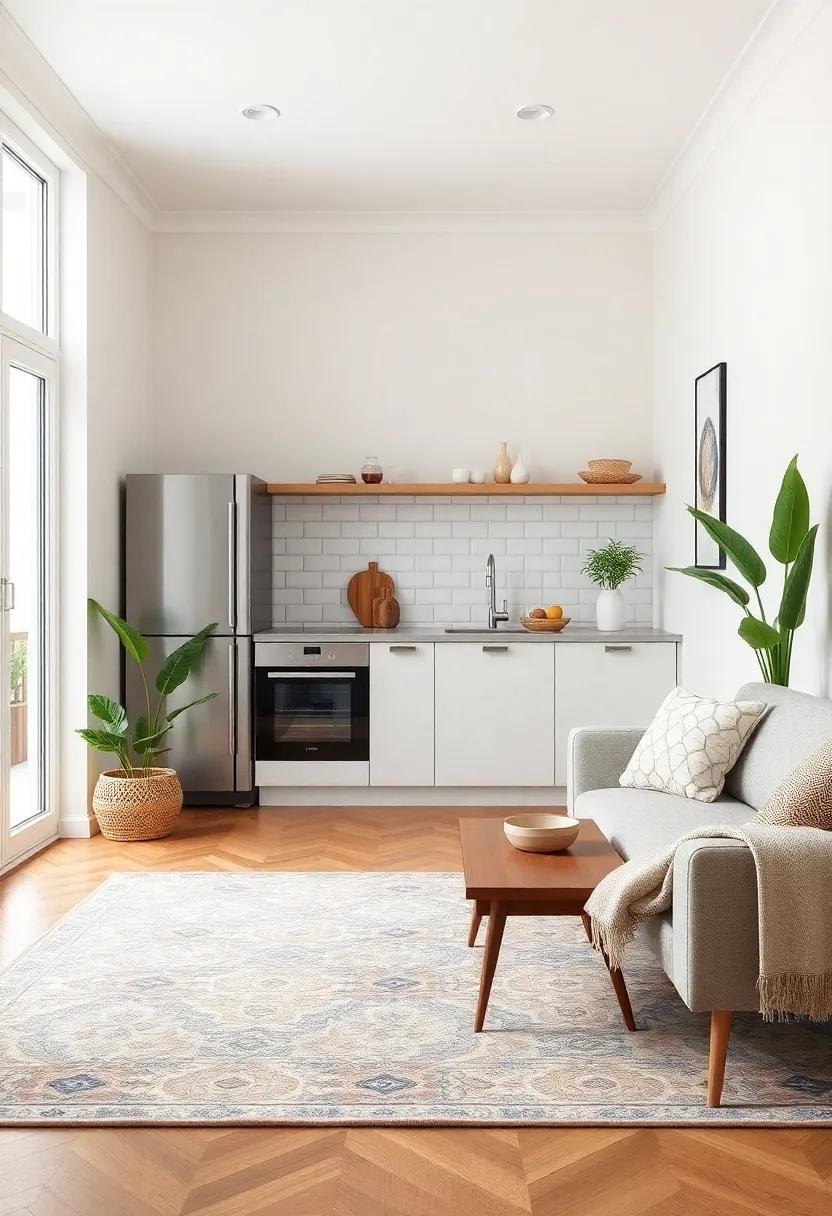
In the compact realm of small kitchens, where every inch counts, multi-functional appliances shine as essential allies. By integrating devices that serve multiple purposes, you can streamline your culinary space without compromising on style or functionality.Consider investing in items like a microwave-convection oven combo, which allows for rapid reheating alongside baking capabilities, or a blender that doubles as a food processor, offering versatility in meal preparation while minimizing countertop clutter. This approach not only saves space but also encourages a more organized kitchen workflow, making meal preparation a breeze.
Another innovative solution is the incorporation of built-in appliances that blend seamlessly into cabinetry. This can include dishwashers hidden behind cabinet doors or refrigerator drawers tucked beneath the countertop. Choosing units that feature smart technology can enhance usability while maintaining a sleek aesthetic. Additionally, open shelving can maximize vertical space, allowing for decorative storage solutions that complement your appliances. For visual harmony, prioritize color-coordinated or even matching appliance sets, which can create a cohesive look while maintaining the varied functionality needed in a small kitchen environment.
Sustainable Materials that Blend Style and Eco-Friendliness in Your Living Room Combo
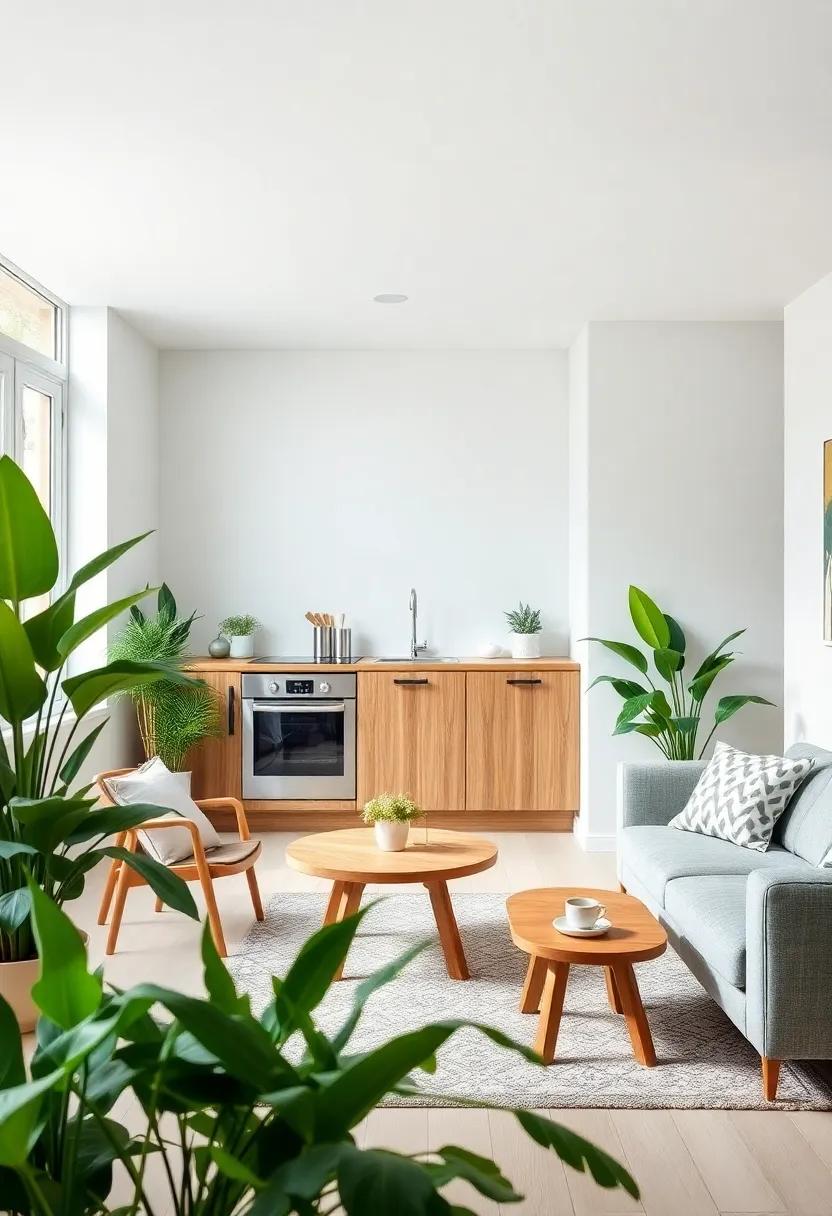
When designing a living room combo that doesn’t compromise on style or the planet, consider incorporating sustainable materials that add both charm and concious to your space. From bamboo furniture, known for its rapid renewability, to plush cushions made from organic cotton, these choices can bring comfort and elegance to your living room. You can also explore accessories crafted from recycled glass or upcycled wood, which not only minimizes waste but introduces a unique storyline to every piece in your home.
To elevate your eco-kind aesthetic, think about following key design principles that harmonize with sustainable materials. Look for items that feature a minimalist design, as they tend to showcase natural textures beautifully. Create balance within your space by focusing on a cohesive color scheme that highlights your eco-friendly choices.Consider adding a touch of biophilic design—incorporating plants not only enhances air quality but also bridges the gap between indoor living and the great outdoors, ultimately creating a more inviting atmosphere:
| Material | Style Element | Eco Impact |
|---|---|---|
| Bamboo | Furniture | Fast-growing, renewable resource |
| Organic Cotton | Textiles | Pesticide-free cultivation |
| Recycled Glass | Decor | Reduces landfill waste |
| Upcycled Wood | Tables/Units | Reduces deforestation |
Visual Connections: Using Open Shelving to showcase Style and Utility
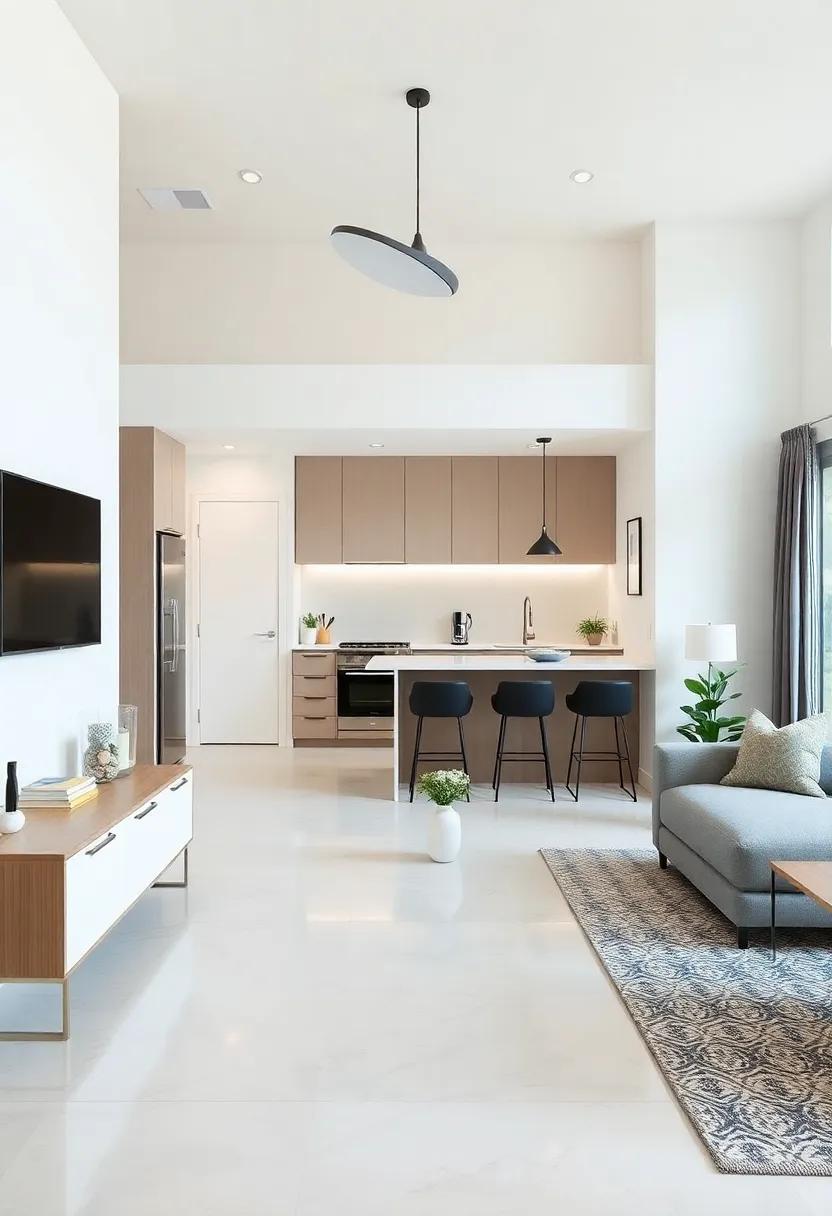
Open shelving is not just a practical solution for storage; it’s an opportunity to curate a personal display that reflects individual style. The beauty of open shelving lies in its ability to blend functionality with aesthetic appeal. in small living spaces, where every inch counts, these shelves can serve dual purposes by housing not only kitchen essentials but also decorative pieces. Consider incorporating a mix of items such as:
- Colorful dinnerware that adds a pop of vibrancy
- Artistic glass jars for dry ingredients or spices
- Cookbooks, showcasing your passion for culinary creativity
- Framed photographs or artwork to personalize your space
In addition to enhancing visual appeal, open shelving can be strategically placed to improve accessibility and encourage organized living. For example, positioning herb pots and cooking oils within arm’s reach enhances culinary efficiency while infusing green life into the kitchen environment. To maximize this concept, consider the following:
| Placement | Benefits |
|---|---|
| Above the sink | Utilizes vertical space and keeps essentials within reach |
| Adjacent to the cooking area | Streamlines the cooking process |
| In the living area | Doubles as display space for books and decor |
Artful Decor Choices that Reflect Personality While Optimizing Small Spaces
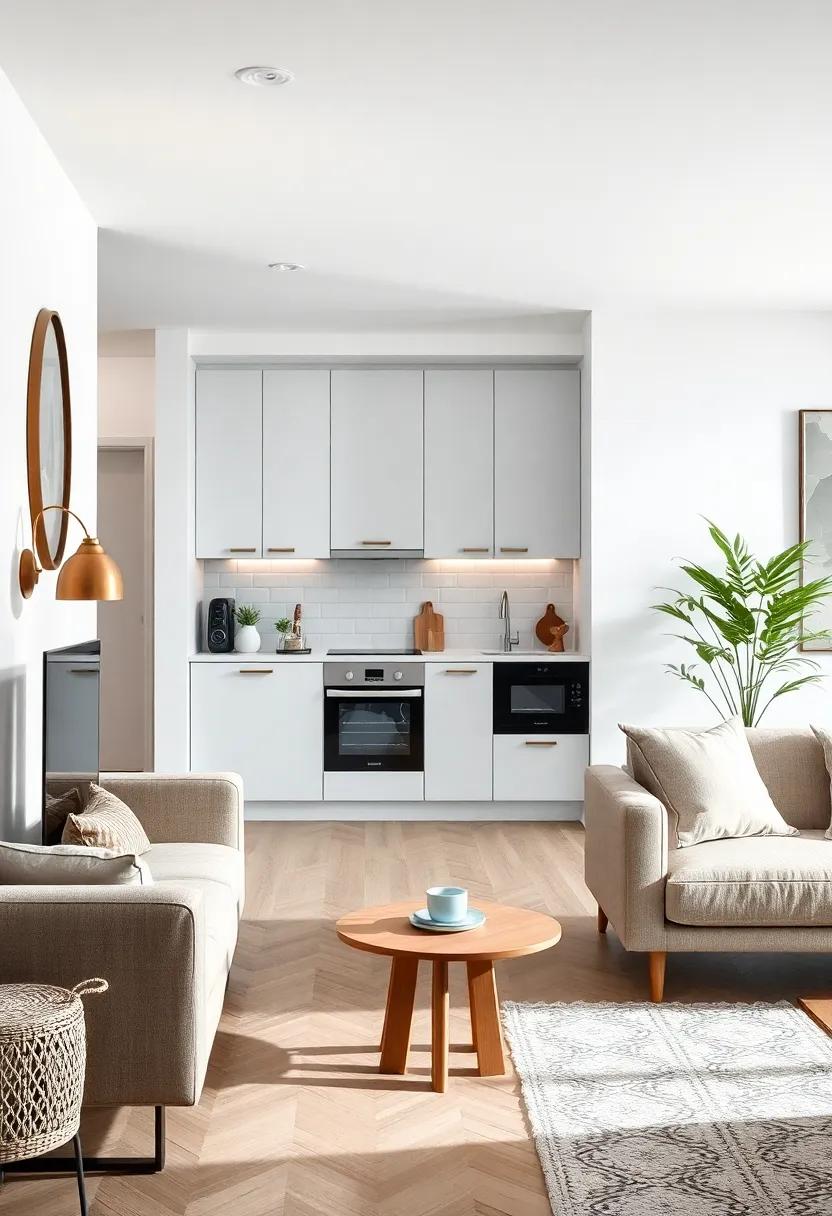
When it comes to small spaces, the right decor can turn your kitchen-living room combo into a reflection of your unique personality. Consider integrating multifunctional furniture that blends style with purpose. For instance, a chic coffee table that doubles as storage not only keeps the area clutter-free but also showcases your flair for design. Add a splash of color with accent pillows, or introduce vibrant artwork that speaks to your interests, fostering a lively and inviting atmosphere.
To further personalize your space, explore eclectic decor choices that tell a story. You might display a collection of travel souvenirs or family heirlooms on floating shelves, creating a gallery wall that engages guests. Consider these key elements in your design approach:
- Light Fixtures: Unique pendant lights or stylish sconces can act as statement pieces.
- Textiles: Play with different fabrics, from linen table runners to patterned area rugs.
- Plants: Incorporate greenery with wall-mounted planters or small potted herbs on windowsills.
By strategically embracing your tastes while choosing decor that solves space challenges, you can curate an area that is not only functional but truly you.
Harmonizing Textures: Creating Visual Interest in Limited living Areas
In a small living space, the interplay of different materials can elevate the overall aesthetic while preserving functionality. Incorporating a mix of textures such as soft textiles, sleek metals, and natural woods adds depth, making the area feel more dynamic. Consider using a cozy woven rug to define the living space, paired with a lusciously upholstered couch that invites relaxation. Complement this with industrial-style shelving in brushed aluminum or galvanized steel to achieve a balance between warmth and contemporary flair. accessories like ceramic vases and silk cushions can serve as focal points, drawing the eye and encouraging exploration of the space’s unique character.
To effectively integrate various textures, utilize a cohesive color palette that ties the elements together. Here’s a quick guide to combining textures harmoniously:
| Texture | Color Suggestions | Ideal settings |
|---|---|---|
| Wood | Warm neutrals, earthy tones | Flooring, furniture accents |
| Fabric | Soft pastels, muted shades | Upholstery, curtains |
| Metal | Cool greys, matte blacks | Lighting fixtures, frames |
Combining these elements not only enhances visual interest but also outlines distinct areas within the multifunctional space. Adding greenery in textured planters or using bold artwork with mixed materials can further enrich the atmosphere, creating a vibrant yet cohesive look that maximizes both style and utility.
Incorporating Nature: How Plant Life Can Transform Small Indoor Environments
In the quest to enhance the aesthetics and functionality of compact kitchen and living room combos,the incorporation of plant life serves as a game-changer. Beyond their ability to introduce vibrant colors and textures, plants purify the air and create a more inviting atmosphere. When selecting greenery, consider plants that thrive in lower light and compact sizes, such as:
- Snake Plant – Resilient and stylish, perfect for corners.
- Pothos – Trailing vines that add depth and layer.
- Spider Plant – Adaptable and charming, great for hanging pots.
Positioning these plants on countertops, shelves, or window sills not only optimizes space but also integrates nature into your living environment. Utilizing vertical gardening techniques can be notably effective, making the most out of limited square footage while enhancing visual appeal. Consider a small indoor herb garden which can offer both greenery and practical use, as shown in the table below:
| Herb | Care tips | Culinary Uses |
|---|---|---|
| Basil | Bright light; water when soil is dry. | Pizzas, sauces, salads. |
| Mint | Partial shade; keep soil moist. | Teas, desserts, salads. |
| Parsley | Full sun; allow soil to dry slightly. | Garnishes, soups, salads. |
Cohesive Flooring options to Seamlessly Tie Together Kitchen and Living Room Areas
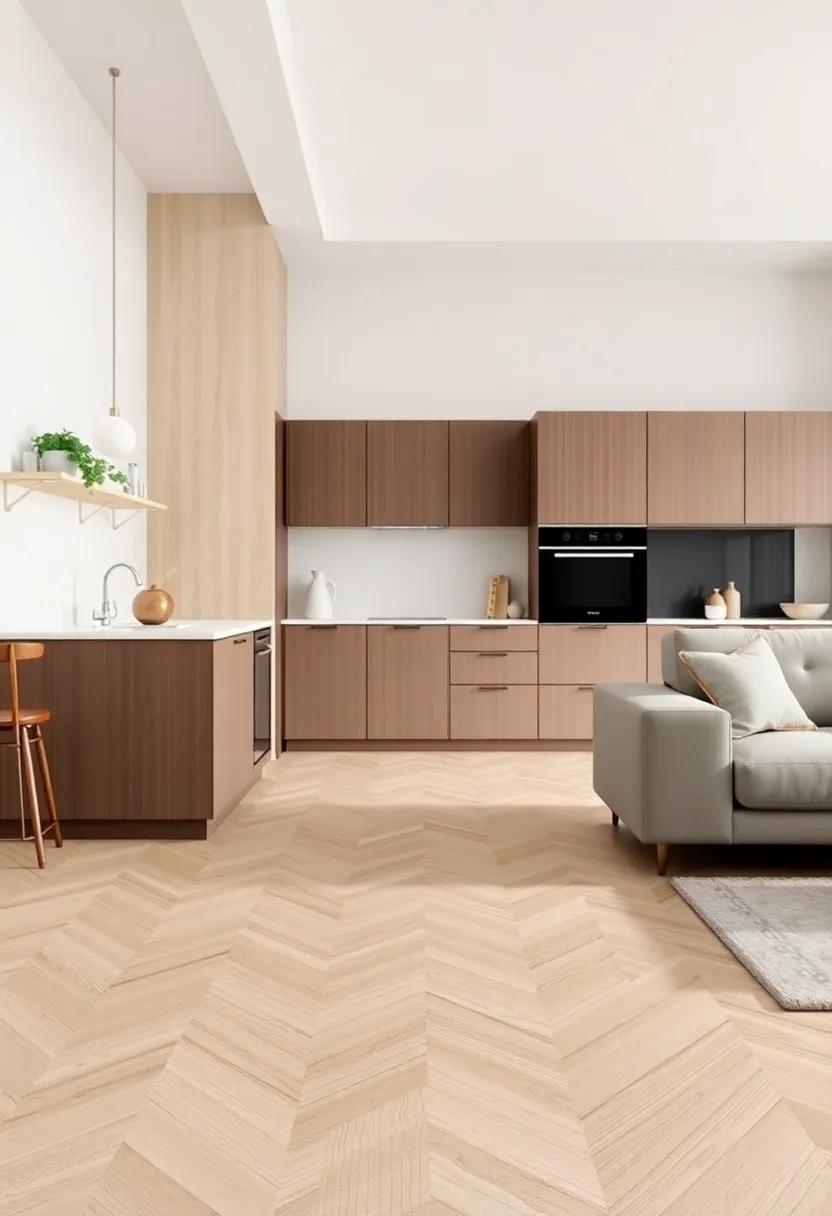
Creating a harmonious flow between kitchen and living room spaces can substantially enhance the overall aesthetic and functionality of your home. Cohesive flooring options serve as a superb foundation for this seamless integration. Consider materials that not only complement each other in terms of style but also in durability and ease of maintenance. Here are a few standout choices:
- Luxury Vinyl Plank: Offers the look of hardwood with excellent water resistance, perfect for both zones.
- Laminate Flooring: Ideal for budget-conscious homeowners while providing a unified appearance.
- Tile: A timeless choice that is durable and can seamlessly blend with various decor styles.
- Engineered Wood: Combines the beauty of real wood with enhanced stability, suitable for mixed-use areas.
To effectively tie these spaces together, it’s essential to consider color and texture harmony. Selecting a consistent hue for your flooring can visually expand your layout,making both spaces feel larger and more connected. Additionally, incorporating area rugs can delineate zones while echoing the overall flooring theme.Here’s a quick comparison of flooring options to guide your choice:
| Flooring Type | Durability | Water Resistance | Maintenance |
|---|---|---|---|
| Luxury Vinyl Plank | High | Excellent | Low |
| Laminate Flooring | Moderate | Low | Moderate |
| Tile | Very High | Excellent | Low |
| Engineered Wood | High | Moderate | Low |
The Power of Mirrors: Expanding Perception and Light in Compact Spaces
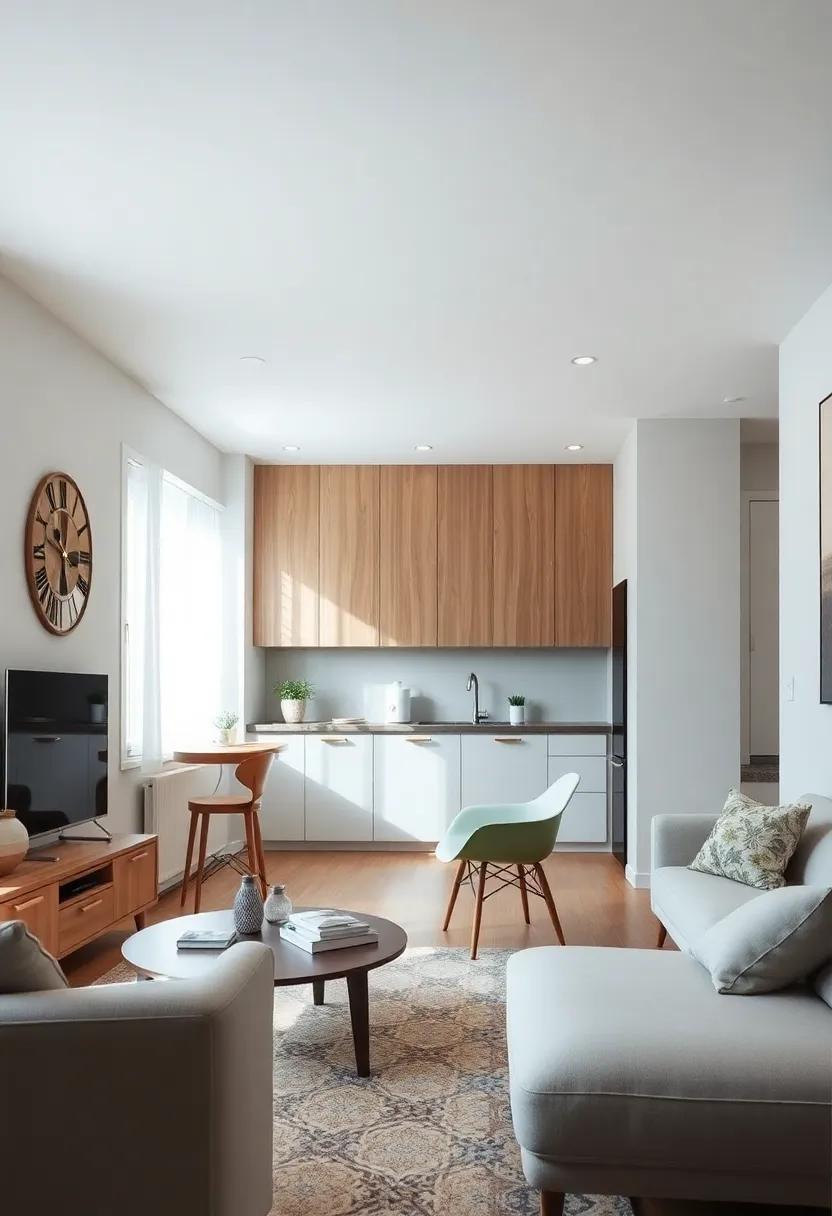
Mirrors hold an extraordinary ability to transform the ambiance of small kitchens and living room combos, acting as strategic tools that not only enhance aesthetic appeal but also amplify spatial perception. By reflecting light and creating a sense of depth, mirrors can make confined areas feel more expansive and welcoming. To effectively incorporate mirrors into your design scheme,consider various placements and styles that harmonize with your decor. Options include:
- Accent Mirrors: Use decorative mirrors with unique shapes or frames as focal points on walls.
- Wall-to-Wall Panels: Install mirrored panels that stretch across a wall, helping to brighten and open up the space.
- Mirrored furniture: Introduce pieces like coffee tables or cabinets with mirrored finishes that add glamour while reflecting light.
What’s even more interesting is the interplay of light and design that mirrors facilitate, making the most of natural and artificial illumination. For example, placing a mirror opposite a window not only draws in daylight but also enhances the warmth of your living area. Pairing mirrors with well-placed lighting fixtures creates an inviting atmosphere, allowed by the doubled radiance and dynamic shadows.When planning your layout, consider key elements such as:
| Element | Function |
|---|---|
| Mirror Size | Choose a proportionate size for balance and impact. |
| Positioning | Place mirrors to capture and amplify light effectively. |
| Frame Style | Select frames that complement your overall decor theme. |
Personalized Wall Art Ideas that Serve as Conversation Starters in Small Rooms
Transform your small kitchen or living room into a gallery of personal stories with carefully curated wall art that sparks conversation. Start with a gallery wall featuring an eclectic mix of photographs,artwork,and personal memorabilia. consider combining framed travel photos with local art,or perhaps a collection of vintage cookbooks arranged in a striking arrangement. This approach not only adds a unique style but also invites guests to share their experiences and stories related to the pieces displayed, making for an inviting atmosphere.
Another option is to explore the charm of text-based art that highlights favorite quotes,personal mottos,or humorous sayings. Use typography to enhance the aesthetics of your space while encouraging engaging dialog. For a striking effect,consider a rotating chalkboard or a customized canvas that allows you to swap out messages and designs as your mood changes. This dynamic element can keep the decor feeling fresh and stimulate interactions,captivating guests with your evolving artistic expression.
Strategic Room Dividers: Balancing Openness and Privacy in Multi-Use Areas
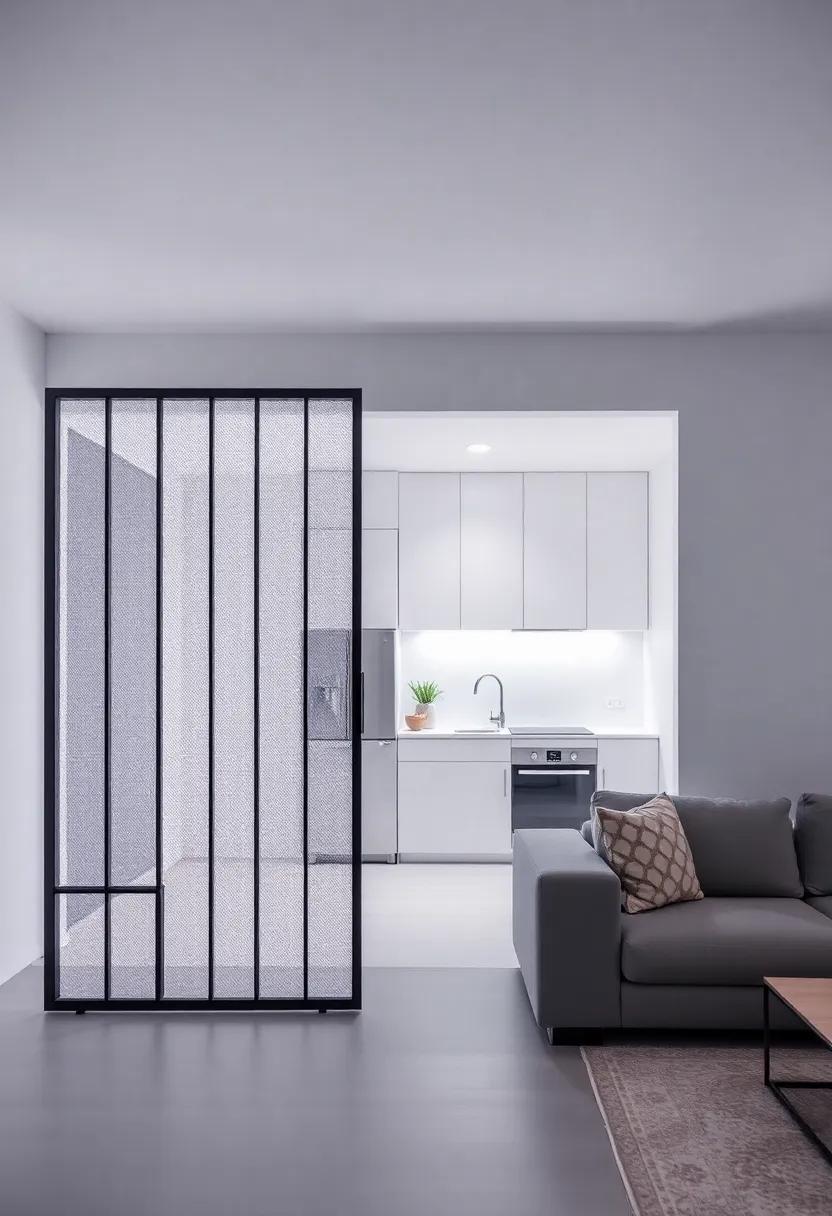
In today’s versatile living spaces, achieving a harmonious blend of openness and privacy is crucial, especially in dual-purpose areas like small kitchens and living rooms. Strategic room dividers come to the forefront as not just practical solutions, but also as innovative design elements. They can redefine zones within a compact area while maintaining a sense of airiness. Options such as sliding panels, folding screens, or even livable dividers—like bookshelves filled with decorative items—allow for a customizable approach without the feeling of confinement. By using materials like glass or lightweight metals, you can create visual connections between spaces while enhancing the overall aesthetic appeal of the room.
Moreover,incorporating these dividers can also streamline functionality. Consider dividers with integrated storage solutions or those that can also function as a workspace, effectively minimizing clutter while maximizing efficiency. An effective layout might include:
- Bi-fold doors for easy transitions between spaces
- Open shelving dividers that offer both display and separation
- Textile panels that add warmth while providing acoustic benefits
The key is to choose designs that resonate with your personal style while also addressing the practical needs of cooking, dining, and relaxing within a continuous flow of functionality.
Showcasing Statement Pieces to Make Compact Spaces Feel luxurious
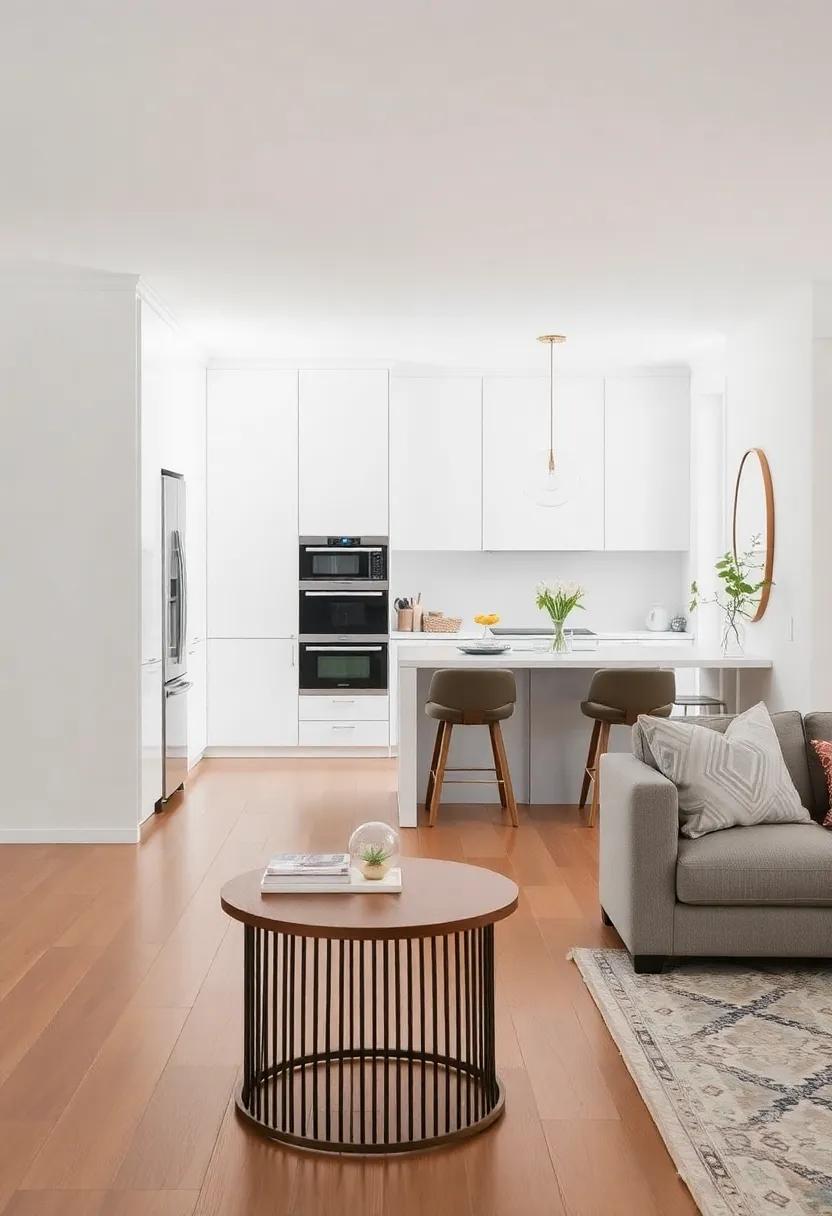
When it comes to maximizing style in compact spaces, selecting the right statement pieces can turn your small kitchen and living room combo into a luxurious oasis. Opt for bold,oversized artwork that serves as a focal point,drawing the eye and creating depth. Consider incorporating unique light fixtures, such as a shimmering pendant light or an eye-catching chandelier, to add an element of sophistication while also illuminating the space. Other ideas include:
- Textured textiles: Rich fabrics like velvet or silk can elevate the look of your seating and throw pillows.
- Designer accessories: Curate a selection of chic ceramics or sculptural decor items to display on shelves or countertops.
- Statement furniture: A classic armchair or an artistic coffee table can serve dual purposes—function and flair.
Another effective method is to create contrast through color and materials. As an example, pairing sleek, modern cabinetry with vintage-inspired elements can evoke a sense of timeless elegance. Utilize mirrors strategically to reflect light and create the illusion of a larger space, enhancing the luxurious feel. A small bar cart adorned with premium glassware and stylish mixers can serve as both a functional and decorative item. Consider the following:
| Element | Impact |
|---|---|
| Mirrors | Enhances luminosity and depth. |
| Chic Lighting | creates a warm ambiance, elevating aesthetics. |
| Artful Accessories | Adds personal touch and visual interest. |
Crafting a Cohesive Design Theme: From Kitchen to Living Room with Ease
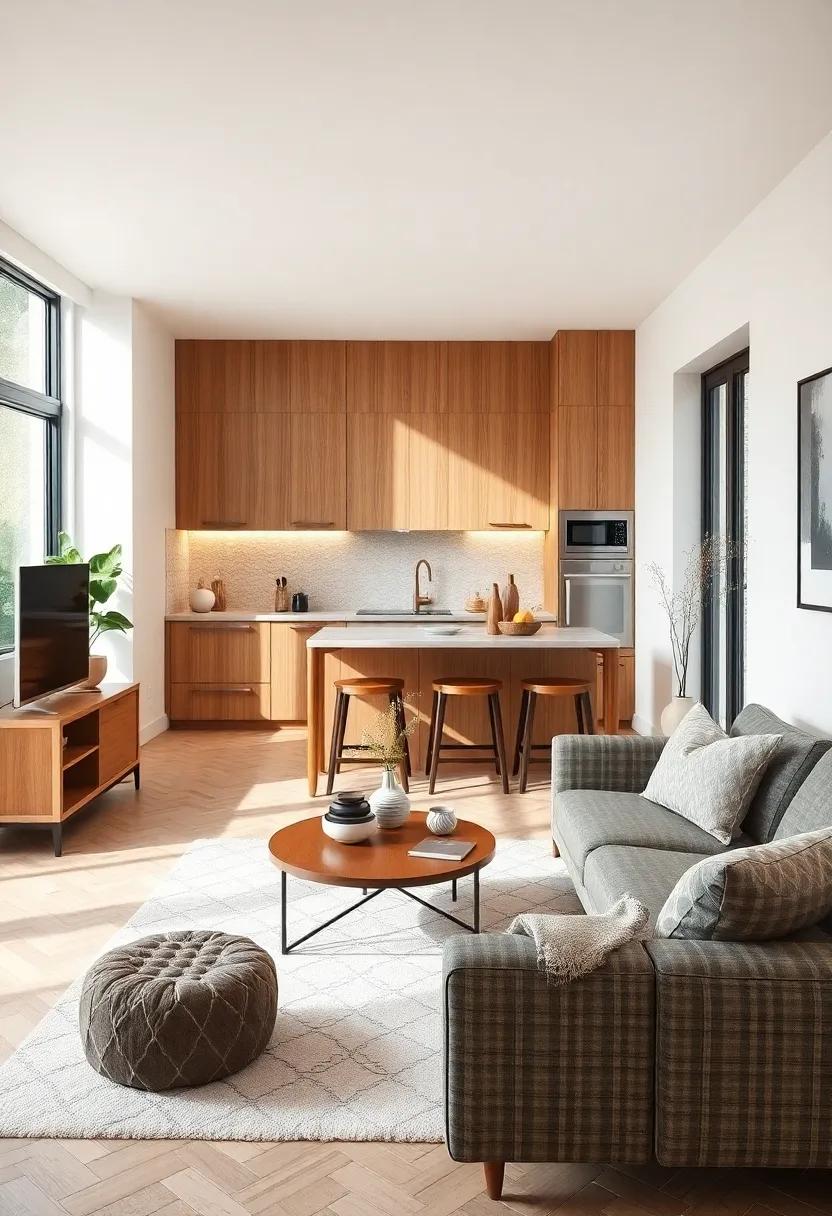
To achieve a harmonious flow between your kitchen and living room, start by selecting a color palette that resonates throughout both spaces. This can be accomplished by using complementary shades for walls and furnishings, such as soft neutrals paired with vibrant accent colors. Incorporating textiles—like cushions, throws, and kitchen linens—can also reinforce this aesthetic while adding warmth and texture. Consider these key elements:
- Shared Color Accents: Use similar colors in wall art and kitchenware.
- Consistent Materials: Opt for the same flooring or cabinetry that connects both areas.
- Open Shelving: Display decorative items that can be appreciated from both spaces.
Maximizing functionality requires innovative furniture choices that serve dual purposes,especially in compact layouts. Look for extendable dining tables that fit snugly in the kitchen but can be opened for entertaining in the living room. Additionally, choosing multifunctional seating, such as ottomans with storage, can make a meaningful impact. To visualize this synergy,refer to the simple table below that outlines potential furniture options:
| Furniture Type | Functionality |
|---|---|
| Extendable Table | Dining + Workspace |
| corner Sofa | Seating + Storage |
| Bar Cart | Serving + Mobile Storage |
Effective Color Blocking Techniques to Create Dynamic yet Functional Spaces
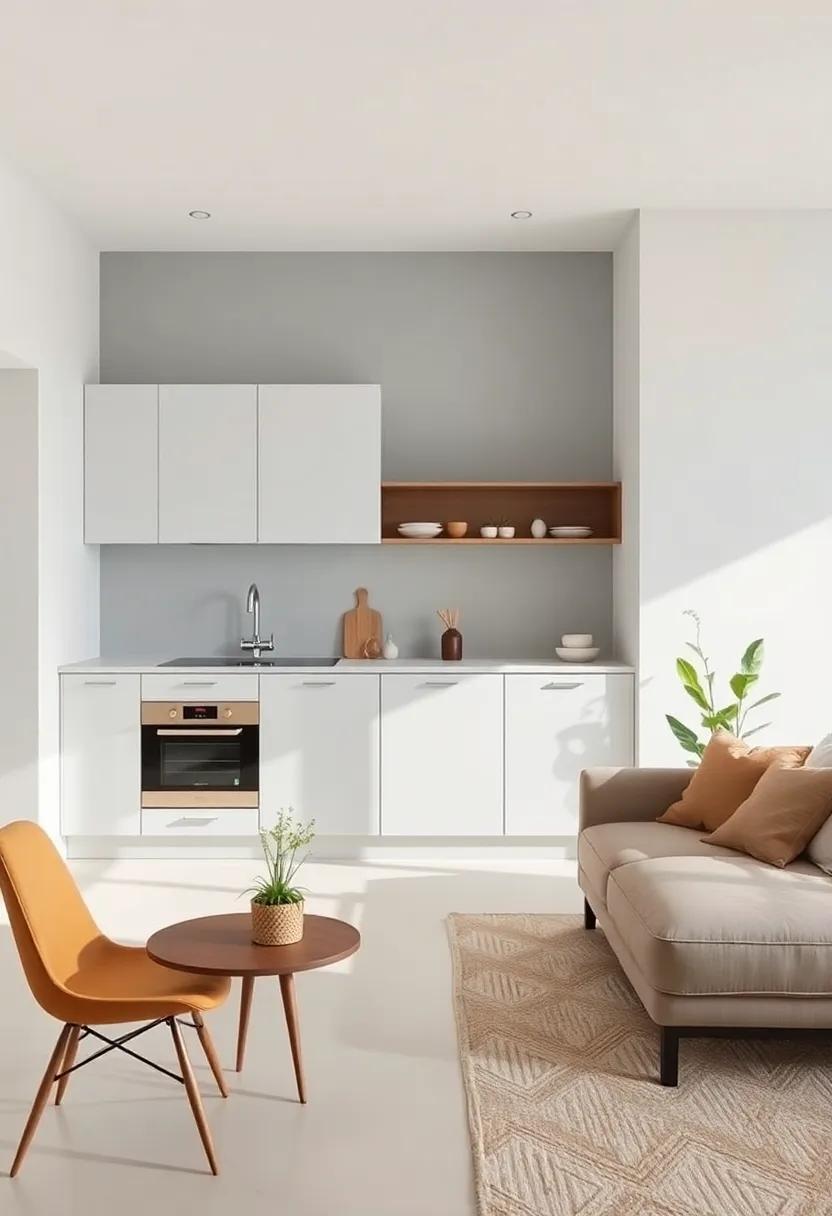
In small kitchen and living room combos,color blocking emerges as a powerful technique to delineate spaces while enhancing their aesthetic appeal.By applying contrasting colors in a strategic manner, you can create zones that are visually distinct yet harmoniously connected. As a notable example, consider using bold hues like royal blue for the kitchen cabinetry paired with a soft pastel shade on the living room walls. This approach not only defines each area but also injects personality into the space. remember to utilize color swatches to ensure a cohesive look, emphasizing two or three primary colors that complement one another.
Functionality remains a top priority in compact areas. Use color blocking to draw attention to essential features such as shelving or dining areas while allowing for contemplation. Here are some practical color blocking techniques to consider:
- Accent Walls: Paint one wall in a vibrant shade to create an eye-catching focal point.
- Furniture Color Coordination: Opt for sofas or chairs in contrasting colors to enhance the vibrancy of the kitchen space.
- Textile Play: Incorporate bold-colored cushions or table runners that tie the kitchen and living room together.
Incorporating these techniques fosters an engaging environment that is both visually striking and functionally efficient. Above all, remember that the goal is to strike a balance between creativity and practicality.
Choosing the Right Fabrics for Comfort and Durability in Small Living Areas
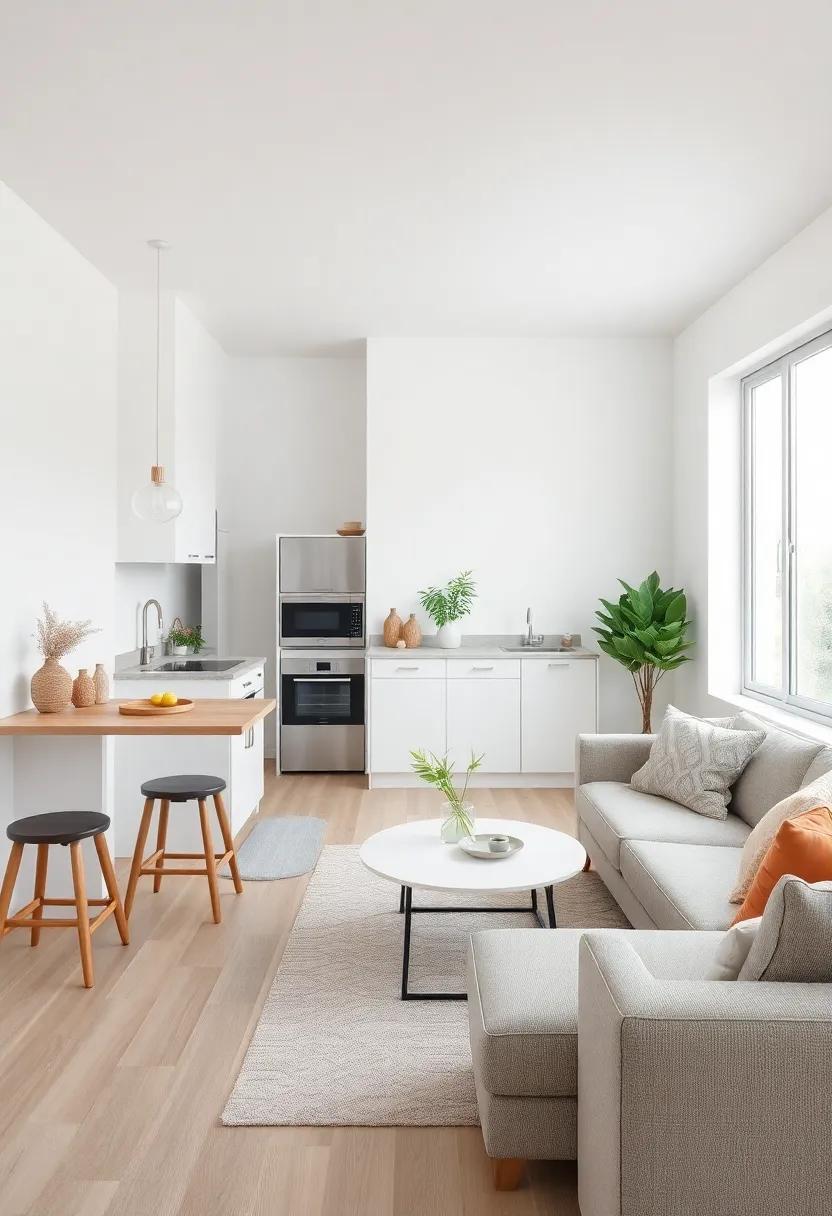
When selecting fabrics for small living areas, it’s crucial to strike the perfect balance between comfort and durability. Given the limited space, you want materials that can withstand daily wear and tear, while also providing a cozy atmosphere. Look for high-quality, natural fibers like cotton and linen, which offer breathability and comfort. Additionally, consider synthetic options such as polyester or nylon blends. They are incredibly resilient and often easier to clean, making them suitable choices for furniture in small, busy households. To maintain a cohesive look, opt for fabrics in neutral or light shades, which can definitely help make the space appear larger and more inviting.
Aside from fabric choice, the texture and pattern also play a significant role in achieving a stylish yet functional environment. Consider integrating various textured fabrics like velvet or tweed to add depth to your seating arrangements without overwhelming the space. Alternatively, geometric or floral patterns can introduce visual interest without compromising on the durability needed for everyday living. For optimal results, you might also want to incorporate a mix of soft throw blankets and decorative cushions made from these selected fabrics.This approach not only enhances comfort but also contributes to a stylish layered look that defines modern small living areas.
Transforming Small Spaces with Trendy Rugs that Define and Warm Your Home
In a world where space is at a premium, defining your small kitchen and living room combo with trendy rugs is an art form that can transform the ambiance of your home. A carefully chosen rug not only adds color and pattern but also serves as a unifying element for your decor. Opt for geometric patterns or bold colors that catch the eye and create a focal point in the room. Pair this with more muted furnishings to ensure balance, and consider layering rugs to amplify texture and warmth, making your small space feel both cozy and inviting.
When selecting the right rug, it’s crucial to consider both style and functionality. Look for options that complement your decor while being easy to clean and maintain. Materials like indoor-outdoor rugs or washable fabrics offer practicality without compromising on design. Remember, the right size is vital—too small may feel lost, while too large can overwhelm the space. Here’s a quick guide to selecting a rug that harmonizes with your layout:
| Rug Size | Best Fit | Style Advice |
|---|---|---|
| 2’ x 3’ | Entryways or small nooks | bold patterns |
| 5’ x 7’ | Under coffee tables | Geometric styles |
| 8’ x 10’ | Living areas | Solid colors for a cozy feel |
Innovative Layout Ideas for Optimizing Flow Between Kitchen and Living Room
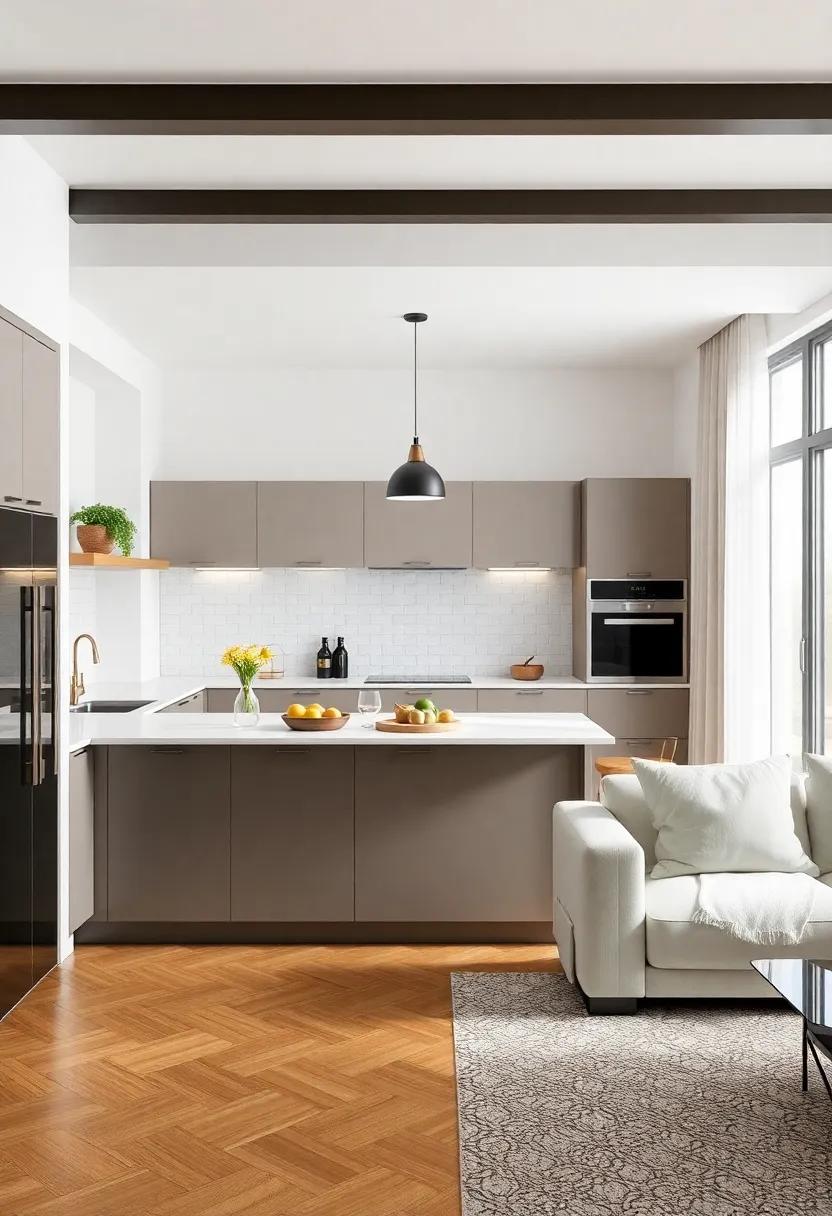
Creating a seamless transition between your kitchen and living room can elevate both the aesthetic and functionality of your space. One innovative layout idea is to implement an open-concept design that merges the two areas while maintaining distinct yet complementary styles.Consider using a central island that serves as both a cooking space and a casual dining spot, effectively drawing the eye and encouraging a natural flow. Incorporating multi-functional furniture like ottomans or benches that provide extra seating while doubling as storage can optimize space and enhance versatility.
Another approach is to use color schemes and textures that unify the kitchen and living area. By selecting a consistent color palette, you can create visual continuity that smoothens the transition. Utilize elements such as backlit shelves or glass partitions to delineate spaces while keeping the environment open and airy. Here’s a quick overview of elements to consider:
| Element | Purpose |
|---|---|
| Central Island | Serves as cooking and dining area |
| Multi-functional Furniture | Provides extra seating and storage |
| Color Palette | Creates visual continuity |
| Backlit Shelves | Enhances ambiance and functionality |
| Glass Partitions | Defines spaces while maintaining openness |
Functional Decor Elements that Enhance Both style and Usability in Small Spaces
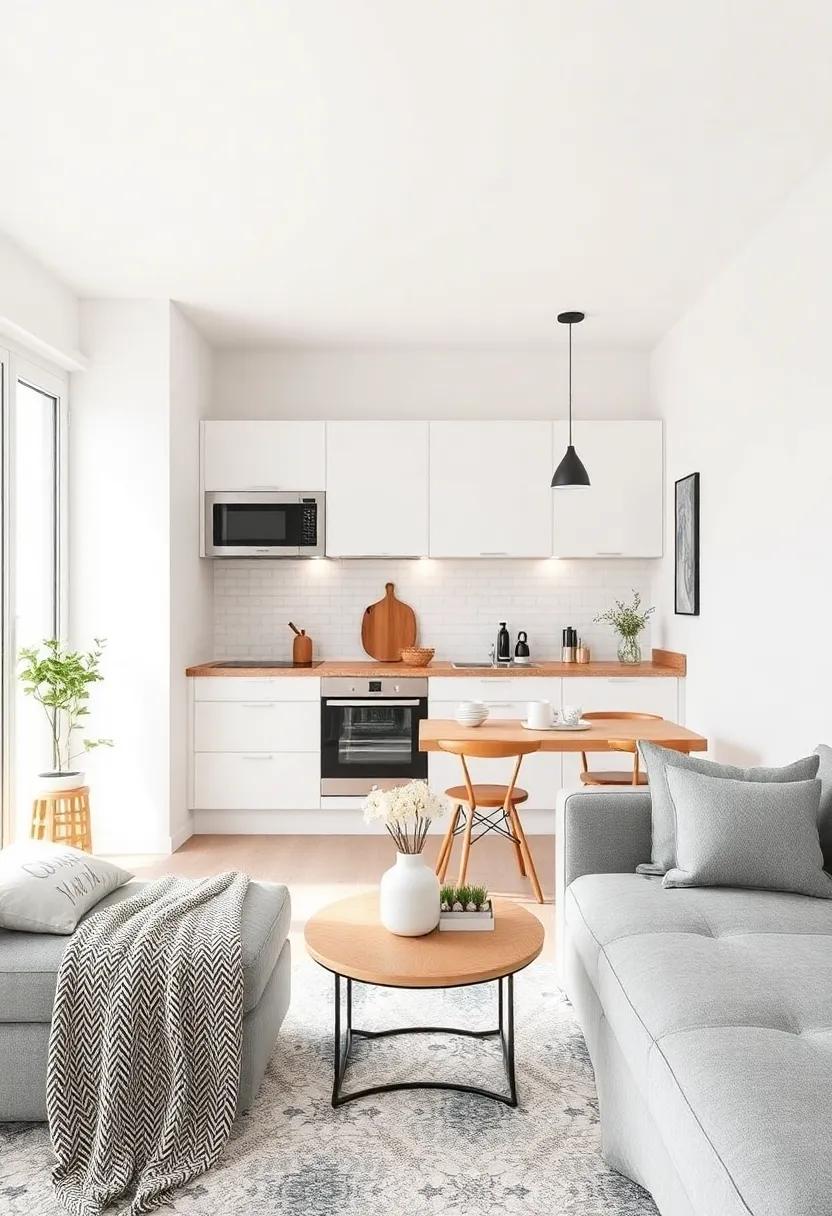
In the quest to balance style and functionality, small spaces can greatly benefit from innovative decor elements. Multi-functional furniture serves as a foundational piece in this design philosophy. Consider a sleek, extendable dining table that can be tucked away when not in use, or elegant ottomans that double as storage units. Such items not only save space but also add a touch of sophistication to your environment. Additionally, wall-mounted shelves are ideal for both display and storage, allowing you to showcase your favorite decor while keeping the floor clear.This vertical space utilization not only enhances the visual aesthetics but also maintains an organized atmosphere.
Moreover, integrating decorative lighting can significantly enhance the usability and ambiance of small areas. pendant lights over the kitchen island or stylish sconces in the living room can create a warm, inviting atmosphere while also providing crucial task lighting. Mirrors, strategically placed, can make the space appear larger and reflect light, adding a chic layer of depth to the environment. Incorporating textured throw pillows and layered rugs can soften the look while offering comfort, making these elements both stylish and practical. By thoughtfully choosing these decor items, you create a cohesive space that feels expansive yet personal.
Utilizing Vertical Space: Smart Storage Solutions for Wall-Mounted Convenience
In a world where every inch matters, mastering the art of utilizing vertical space can transform your kitchen and living room into a hub of style and functionality.Wall-mounted shelves are invaluable for creating an open and airy feel while adding a touch of personalization. Consider installing floating shelves for a minimalist look or modular shelving units for versatility. both options allow you to showcase decorative elements and keep essential items within easy reach. This clever use of wall space elevates the aesthetic while providing ample storage for items such as cookbooks,plants,or art pieces.
Pair your wall-mounted shelving with other smart storage solutions to maximize organization without compromising on design. Pegboards can serve as an ingenious backdrop for kitchen tools or living room accessories, combining practicality with visual appeal. Similarly, hanging racks and hooks can keep items like pots or bags conveniently displayed and out of the way. For an effective plan, refer to the following table that outlines popular wall storage options and their benefits:
| Storage Option | Benefits |
|---|---|
| Floating Shelves | Creates a sense of openness; customizable height |
| Pegboards | Easy access to frequently used tools; customizable layout |
| Wall Hooks | Ideal for displaying items; quick access |
| Modular Units | Flexible design; suits various decor styles |
Creating a Serene Environment: Calming Color Palettes for Combined Living Areas
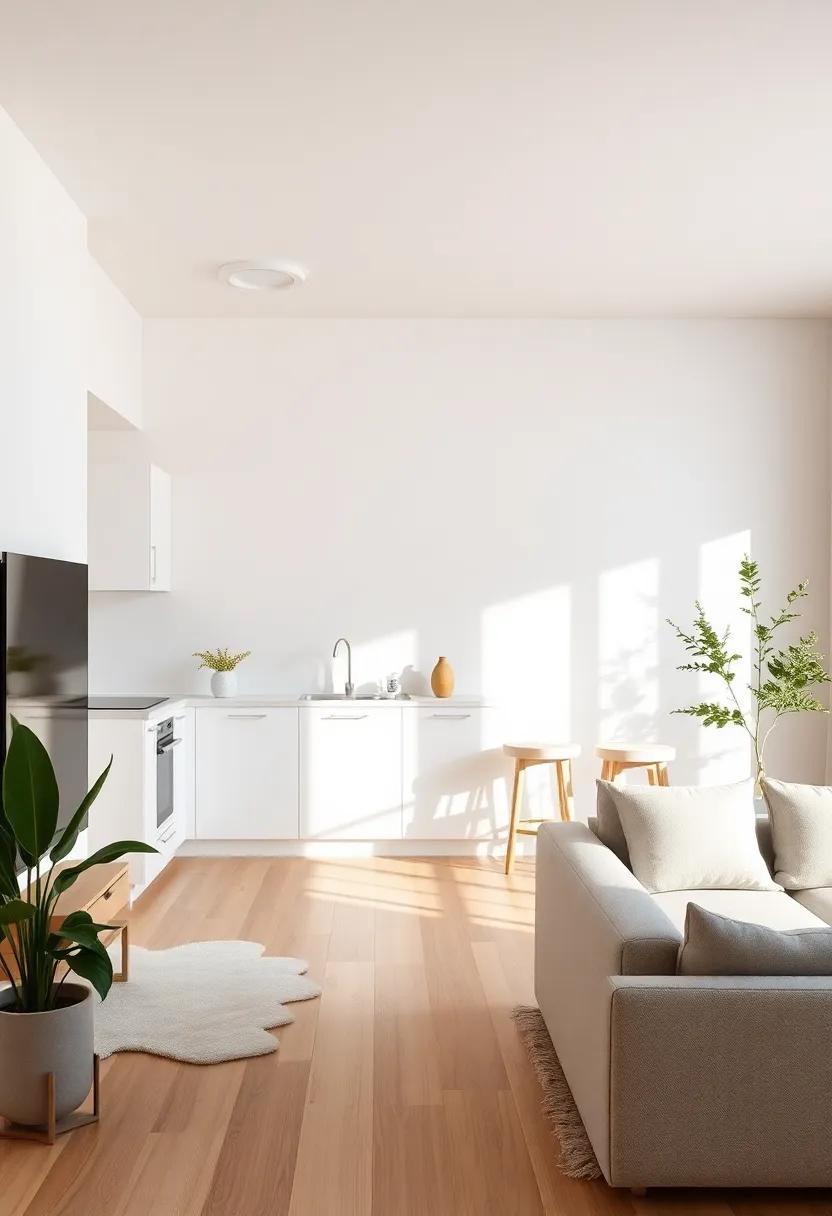
Color plays a crucial role in setting the mood of a space, especially in combined living areas. Opting for a calming color palette can transform your small kitchen and living room combo into a serene sanctuary. Consider soft, muted tones such as pastel blues, gentle greens, and warm neutrals to create a cohesive and tranquil atmosphere. These colors can make the space feel larger and more inviting, while also allowing for seamless transitions between cooking and lounging. Daring accents,such as a burnt orange or deep teal,can be used sparingly—perhaps on cushions or wall art—to inject personality while keeping the overall vibe relaxed.
A strategic use of color can also enhance the functionality of small spaces. When selecting hues for cabinetry or shelving, think about their ability to reflect light and create depth. As a notable example, glossy whites or soft grays can visually expand the area, making it feel airy. To harmonize the kitchen and living room even further, create a simple table that showcases the essential colors and their psychological effects, ensuring your decor choices align with your desired ambiance:
| Color | Effect |
|---|---|
| Pastel Blue | Promotes calmness and tranquility |
| Gentle green | Encourages relaxation and balance |
| Warm Neutral | Creates a cozy and inviting atmosphere |
Harnessing Technology: Smart Home Features that Enhance Small Space Living
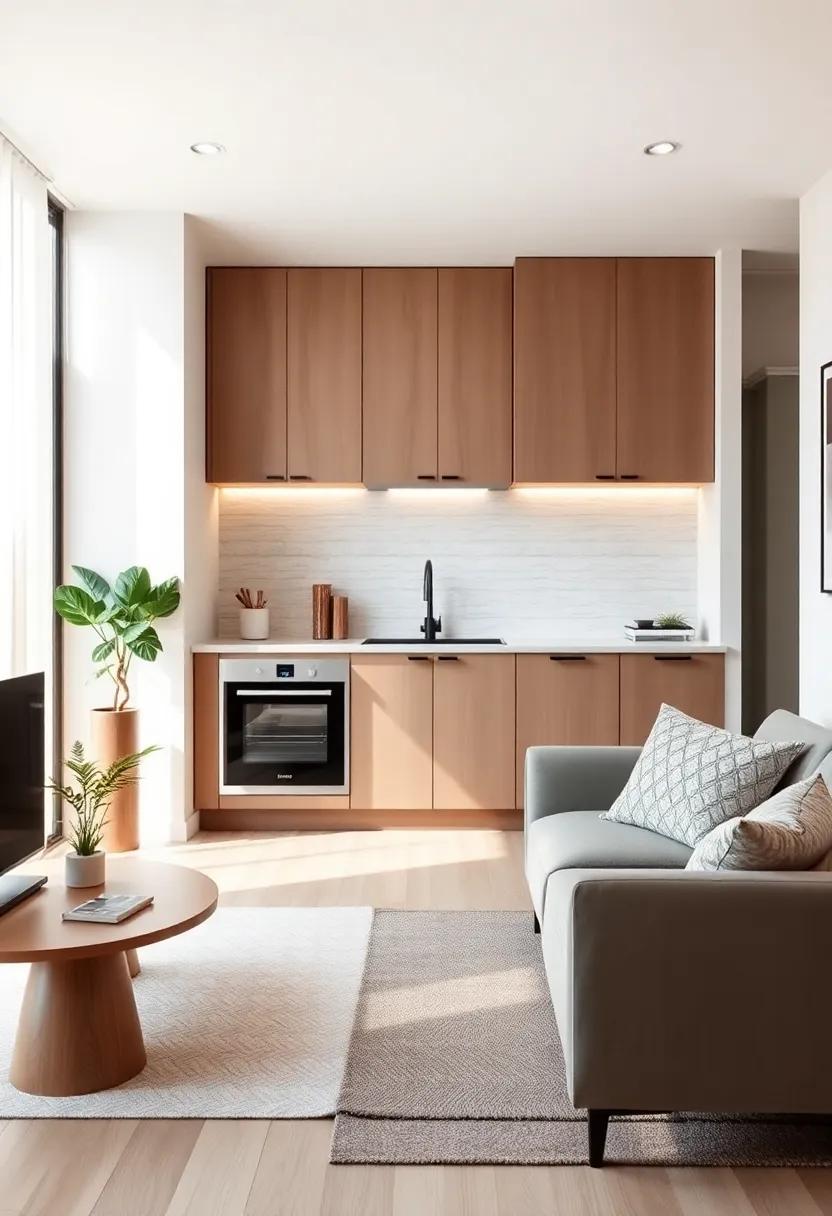
As urban living spaces grow smaller, technology provides solutions that not only save space but also elevate the style of compact environments. Smart home devices offer a seamless blend of functionality and style, transforming how we interact with our living spaces. Features such as smart lighting control allow you to adjust the ambiance for any occasion, whilst compact smart appliances can be efficiently integrated into kitchen setups without sacrificing aesthetic appeal. By utilizing wall-mounted smart displays, for example, you can conserve counter space while accessing recipes and managing tasks right from your living room.
Moreover,the integration of home automation systems can significantly enhance small living areas. these systems allow for centralized control of your smart devices, optimizing your space with tailored settings that match your lifestyle. Consider features such as:
- Voice-activated technology: Control lighting and appliances hands-free.
- Smart thermostats: Maintain ideal temperatures without large units taking up floor space.
- Integrated storage solutions: Combine technology with creativity to disguise clutter.
By strategically employing such technology, small kitchen and living room combos can exude both style and efficiency, creating a home that feels both spacious and inviting.
Embracing Minimalism: Achieving Style and Functionality with Less Clutter
Minimalism isn’t just a trend; it’s a lifestyle that promotes tranquility through simplicity. By focusing on essential items and eliminating excess, you can create a harmonious atmosphere that melds aesthetic appeal with practicality. in small kitchen and living room combos, this principle can be especially transformative. Consider choosing multifunctional furniture, such as a sleek dining table that doubles as a workspace or a sofa bed that offers both comfort and sleeping arrangements for guests. Opt for neutral color palettes to increase the sense of space and incorporate a few carefully selected accents to inject personality into your decor.
To further enhance your minimalist approach,it’s beneficial to utilize smart storage solutions. Implementing cabinetry that reaches the ceiling maximizes vertical space while keeping essentials tucked away. Quick-access organizers in drawers and on walls can help maintain order without compromising style. Here’s a quick look at some practical storage ideas:
| Item | Functionality |
|---|---|
| floating Shelves | Display decor and store small items |
| Storage Ottomans | Offer seating and hidden storage |
| Magnetic Spice Racks | free up counter space |
With intentionality in both design and function, you can create a living area that not only looks good but also supports everyday activities. By employing minimalism to your kitchen and living room combo, you can cultivate a serene environment that invites creativity, connection, and ease of living.
Balancing Formal and Informal Spaces for Versatile Living and Entertaining areas
Creating spaces that comfortably transition between formal and informal functions can elevate both daily life and special gatherings.Stylish furniture choices play a crucial role in this balance. Opt for multipurpose pieces such as a sleek sofa that doubles as a guest bed or a chic coffee table with hidden storage. Area rugs can define zones within your small kitchen and living room combo, delineating the cooking area from your relaxing space while adding warmth and texture. Consider using a color palette that blends versatility and vibrancy—neutral tones for large furniture and pops of color in accessories can achieve a harmonious effect.
Incorporating features that cater to both social and solitary needs is essential for maximizing function. Lighting is a key component; adjustable fixtures such as dimmable overheads or layered lamps can create ambiance suited for both cozy evenings and lively gatherings. Use an open concept for flow, but consider decorative dividers like shelving units to create subtle separations. Outdoor access, like a small balcony or patio, can further extend your entertaining area, transforming a simple get-together into a memorable event. A well-planned space that reflects both elegance and warmth encourages versatile living without compromising style.
Crafting Cozy Nooks: Designing Comfortable Spots in Compact Living Environments
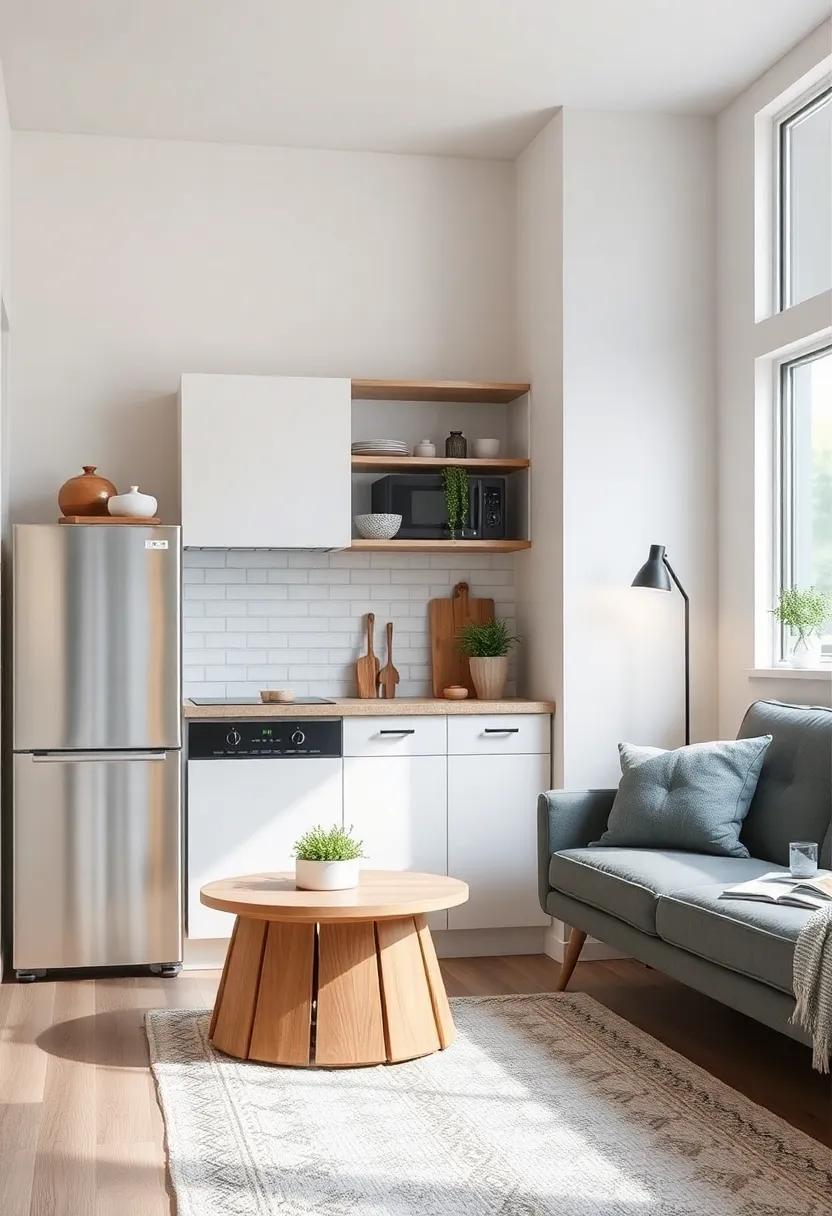
Creating a cozy nook within a compact living environment can transform an ordinary space into a personal sanctuary. consider integrating multi-functional furniture that maximizes utility while adding comfort. As an example, a stylish armchair paired with a small side table can serve as a perfect reading corner. Throw in some decorative pillows and a plush blanket to invite relaxation, and leverage vertical space with floating shelves to display books and cherished items. The use of soft lighting, such as fairy lights or a table lamp, can enhance the inviting atmosphere, turning this corner into a retreat for unwinding.
another effective strategy is to employ color and texture to delineate your cozy nook from the rest of the room. A striking area rug can anchor the space while adding warmth and charm. Utilize color palettes with soft, muted tones to foster tranquility, or bold accents to create a focal point. Accessories like wall art or plants work wonders as they infuse life and personality into the nook. By focusing on these elements, you can carve out a dedicated, comfortable spot that not only serves a functional purpose but also elevates the overall aesthetic of your small kitchen and living room combo.
Finding Balance: Merging Style and Practicality for the Ideal Kitchen and Living Room combo
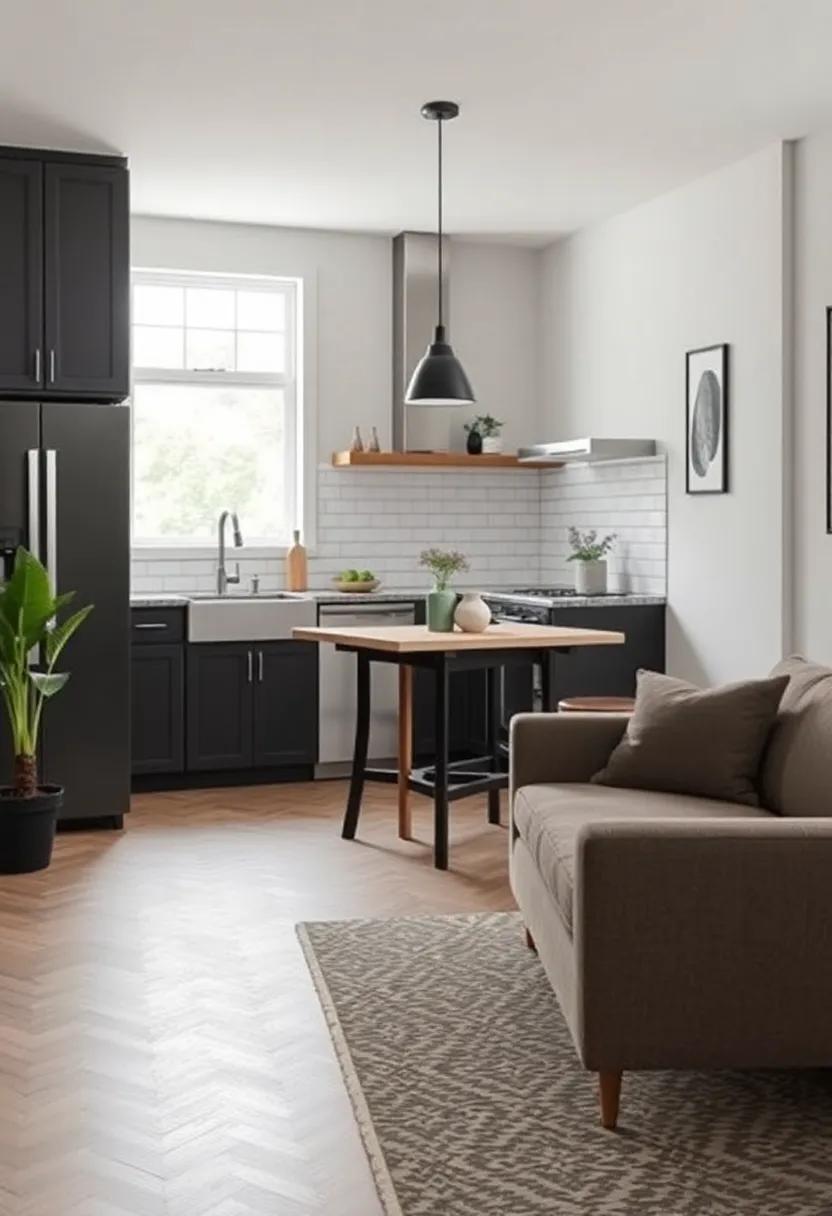
Creating a harmonious connection between your kitchen and living room while ensuring both style and practicality can elevate your home. Incorporating multifunctional furniture plays a crucial role here; such as,consider a kitchen island that doubles as a dining table,providing both a prep area and an inviting space for meals. Accessories like open shelving not only showcase stylish dishware but also keep essentials within easy reach, optimizing space without sacrificing aesthetic appeal. By selecting a cohesive color scheme that flows seamlessly between spaces, you can effortlessly tie together the two areas, enhancing the overall atmosphere of your home.
Lighting can also make a significant difference in achieving the perfect blend of style and functionality. Layered lighting, including ambient fixtures, task lights, and accent lighting, not only highlights design elements but also serves practical needs for both cooking and entertaining. consider the use of visual dividers like a stylish bookshelf or a decorative screen, which can delineate the kitchen from the living area while contributing to an open feel.incorporating personal touches, such as artwork or plants, will infuse character into the space, bridging style and utility effectively.
In Summary
navigating the delicate balance between style and functionality in small kitchen and living room combos can transform even the coziest spaces into stunning, efficient hubs of daily life. By embracing innovative design principles, clever storage solutions, and multifunctional furniture, you can create an environment that reflects your personal taste while meeting your practical needs. As you embark on your own journey of maximizing these shared spaces, remember that every decision counts—each piece, color, and layout holds the power to enhance your experience at home. Whether you’re hosting friends or enjoying a quiet evening in, a thoughtfully designed small kitchen and living room combo can elevate your lifestyle, proving that great design truly knows no bounds. Explore, experiment, and enjoy the endless possibilities that await!

